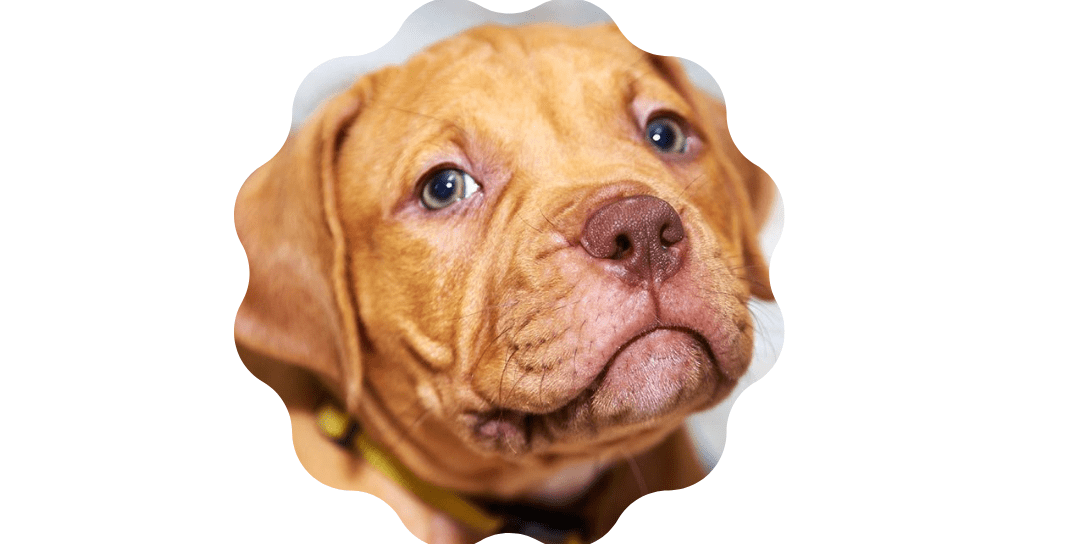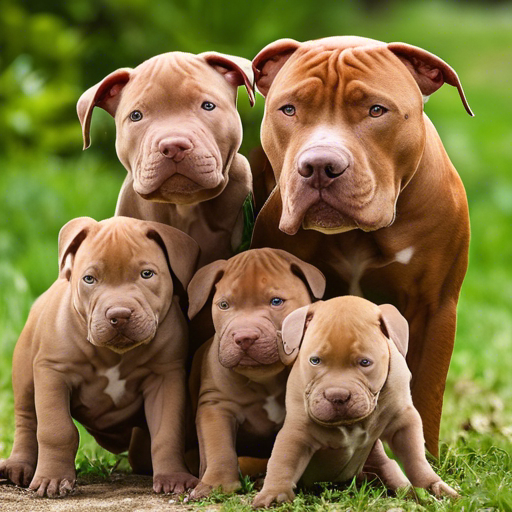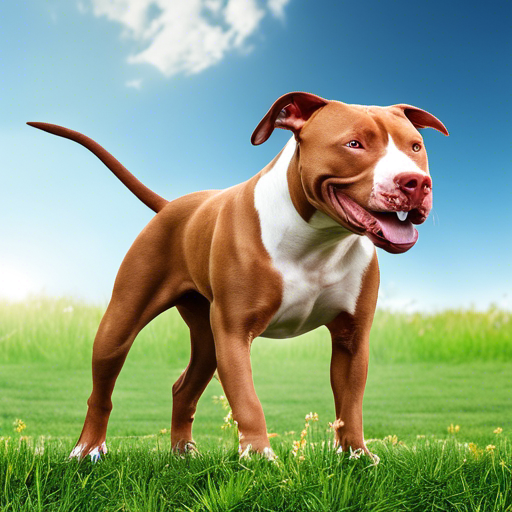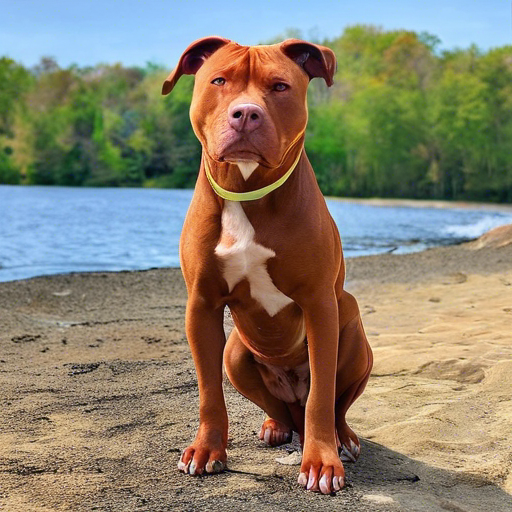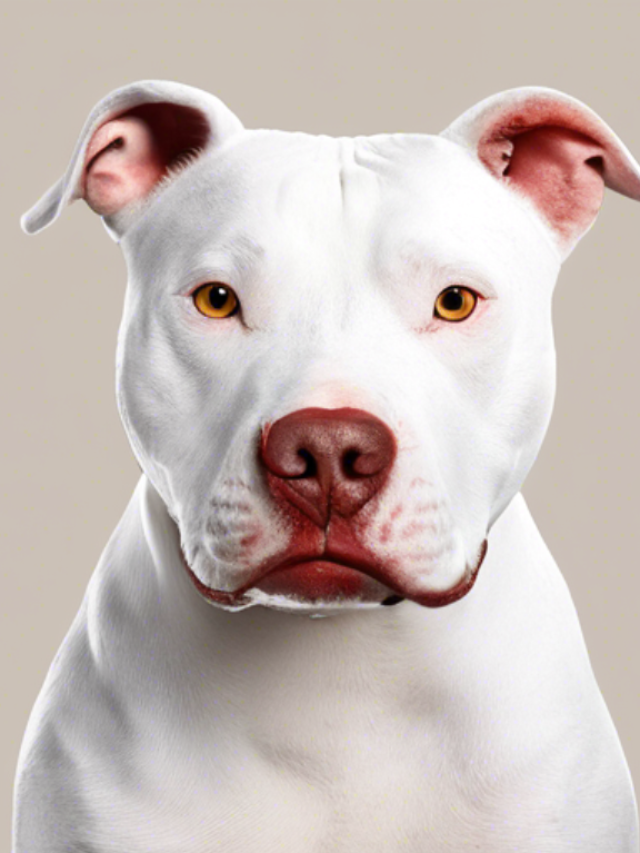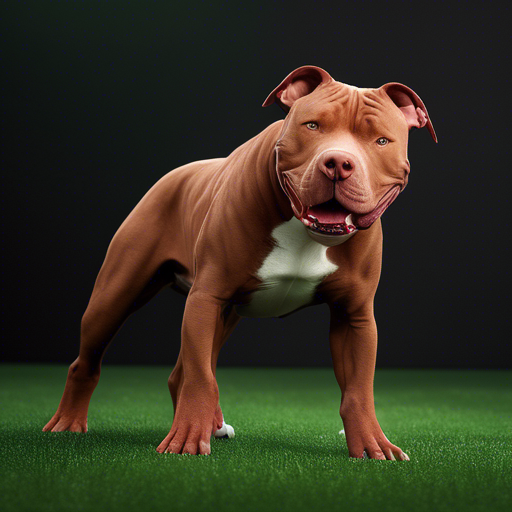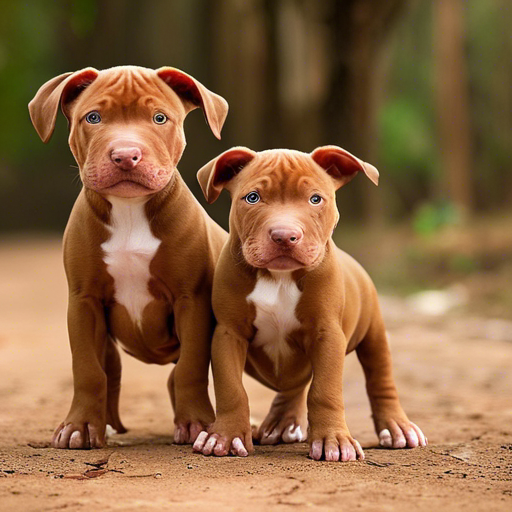The Pitbull Dog Breed: Everything You Need To Know
Introduction:
The Pitbull, also known as the American Pit Bull Terrier, is a breed of dog that is renowned for its strength, agility, and loyalty. Originally bred for bull-baiting and later as farm dogs, they have evolved into beloved companions and family pets.
Physically, Pitbulls are muscular and athletic with a short, smooth coat that comes in various colors such as brindle, black, blue, and fawn. They have a broad head, powerful jaws, and a distinctive square-shaped muzzle.
In terms of temperament, Pitbulls are known for their affectionate nature towards their owners and families. They are highly intelligent and eager to please, making them trainable with consistent and positive reinforcement methods. With proper socialization and training, Pitbulls can be gentle and loving companions.
Despite their loving demeanor, Pitbulls have faced negative stereotypes due to irresponsible ownership and media sensationalism. However, it’s important to note that like any other breed, individual temperament can vary, and proper care, training, and socialization are key factors in shaping a Pitbull’s behavior.
In conclusion, the Pitbull is a loyal, affectionate, and intelligent breed that can make a wonderful companion for the right owner who is willing to invest time and effort into training and socialization. With responsible ownership, Pitbulls can thrive as loving members of the family.
History:
The history of the Pitbull dog dates back to 19th-century England, where they were originally bred for bull-baiting, a cruel sport where dogs were pitted against bulls. The breed was developed by crossing various bulldog and terrier breeds, resulting in a dog with strength, tenacity, and agility.
However, with the outlawing of bull-baiting in the 1800s, Pitbulls found a new role as farm dogs and family companions. They were valued for their loyalty, intelligence, and versatility, serving as guardians of livestock and beloved members of the household.
Pitbulls gained popularity in the United States during the 20th century, where they were cherished for their bravery and loyalty. They became known as American Pit Bull Terriers, reflecting their newfound home and the roles they played in American society.
During this time, Pitbulls were commonly used in various working roles, including hunting, herding, and even serving as military and police dogs. Their versatility and adaptability made them highly sought after in many different tasks.
Unfortunately, Pitbulls have also been subjected to misuse and exploitation by irresponsible owners, leading to negative stereotypes and misconceptions about the breed. However, responsible breeders and owners continue to advocate for the Pitbull, emphasizing their loving nature and positive qualities.
Today, Pitbulls remain a popular breed worldwide, valued for their loyalty, intelligence, and affectionate nature. With proper care, training, and socialization, Pitbulls can make wonderful companions and beloved members of the family.
Characteristics:
The Pitbull dog breed is known for several distinctive characteristics that set them apart:
1. Muscular Build:
Pitbulls have a strong and muscular physique, with a broad chest, powerful shoulders, and sturdy legs. They are built for strength and agility, reflecting their history as working and sporting dogs.
2. Short Coat:
Their coat is short, smooth, and glossy, requiring minimal grooming. Pitbulls come in various colors, including brindle, black, blue, red, and fawn, among others.
3. Strong Jaws:
Pitbulls are famous for their powerful jaws and bite force. While this trait was originally utilized for tasks like bull-baiting, responsible ownership ensures that this strength is channeled positively through appropriate training and enrichment activities.
4. Affectionate Nature:
Despite their strong appearance, Pitbulls are known for their affectionate and loving disposition towards their families. They are often referred to as “nanny dogs” due to their gentle and protective behavior towards children.
5. Intelligence:
Pitbulls are highly intelligent dogs that thrive on mental stimulation and training. They are quick learners and can excel in various activities such as obedience, agility, and even therapy work.
6. Loyal and Protective:
Pitbulls are fiercely loyal to their owners and are known to be protective of their families. They will often go to great lengths to ensure the safety and well-being of their loved ones.
7. Energetic:
Pitbulls have high energy levels and require regular exercise to stay physically and mentally healthy. Engaging in activities like walks, runs, and play sessions helps fulfill their need for stimulation and prevents boredom.
8. Socialization:
Proper socialization is crucial for Pitbulls to ensure they develop into well-adjusted and friendly dogs. Early exposure to various people, animals, and environments helps prevent fearfulness and aggression.
Overall, Pitbulls are loving, loyal, and intelligent companions that thrive in homes where they receive plenty of love, training, and exercise. With responsible ownership, Pitbulls can make wonderful family pets and cherished members of the household.
Temperament:
The temperament of Pitbull dogs is characterized by several key traits:
1. Affectionate:
Pitbulls are known for their deep affection towards their families. They form strong bonds with their owners and are often very loving and loyal companions.
2. Friendly:
Well-socialized Pitbulls are typically friendly and outgoing towards people. They often enjoy being around others and can be quite sociable when properly introduced.
3. Protective:
Pitbulls have a natural instinct to protect their loved ones. They can be fiercely loyal and will show bravery in defending their family members if they sense a threat.
4. Confident:
Pitbulls are typically confident dogs with a strong sense of self-assurance. They are not easily intimidated and can handle various situations with poise and composure.
5. Intelligent:
Pitbulls are highly intelligent dogs that thrive on mental stimulation. They are quick learners and enjoy engaging in activities that challenge their minds.
6. Energetic:
Pitbulls have a high energy level and require regular exercise to stay happy and healthy. They enjoy activities like walks, runs, and play sessions and can become bored or restless without sufficient physical activity.
7. Playful:
Pitbulls often retain a playful and puppy-like demeanor well into adulthood. They enjoy interactive games and toys and can be quite entertaining companions.
8. Stubbornness:
While intelligent, Pitbulls can also be stubborn at times. They may test boundaries and require consistent and patient training to establish obedience.
It’s important to note that individual temperament can vary based on factors such as genetics, upbringing, and socialization. Responsible ownership, proper training, and positive reinforcement techniques are essential for nurturing the best traits in Pitbulls and ensuring they become well-behaved and balanced companions.
cost of pitbull:
The cost of a Pitbull can vary depending on several factors such as the dog’s age, pedigree, lineage, breeder reputation, and geographic location. On average, you can expect to pay anywhere from $500 to $2000 for a Pitbull puppy from a reputable breeder. However, prices can go higher for puppies with champion bloodlines or specific coat colors.
Rescuing a Pitbull from a shelter or rescue organization is another option, which typically involves lower adoption fees ranging from $50 to $300. Adoption fees usually include vaccinations, spaying/neutering, and sometimes microchipping.
It’s important to consider the long-term costs associated with owning a Pitbull, including food, veterinary care, grooming, training, and other expenses. Additionally, budgeting for unexpected medical emergencies is advisable to ensure the well-being of your furry companion.
Care and Maintenance:
1. Nutrition:
Provide your Pitbull with a balanced diet suitable for their age, size, and activity level. High-quality dog food rich in protein is essential for their muscle development and overall health. Ensure access to fresh water at all times and monitor their weight to prevent obesity.
2. Exercise:
Pitbulls are energetic dogs that require regular exercise to stay healthy and prevent boredom. Aim for at least 30 to 60 minutes of physical activity each day, such as brisk walks, runs, or play sessions in a fenced yard. Interactive toys and agility training can also help stimulate their minds.
3. Grooming:
Pitbulls have short coats that are relatively low-maintenance. Brush them weekly to remove loose hair and dirt, and bathe them as needed. Pay attention to their ears for signs of infection and trim their nails regularly to prevent overgrowth and discomfort.
4. Veterinary Care:
Schedule regular check-ups with a veterinarian to monitor your Pitbull’s health and catch any potential issues early. Keep up with vaccinations, parasite prevention, and dental care to ensure their well-being. Discuss spaying or neutering with your vet to prevent unwanted litters and certain health problems.
5. Training and Socialization:
Start training your Pitbull as early as possible using positive reinforcement techniques like treats and praise. Focus on basic obedience commands such as sit, stay, and come, and work on leash manners to prevent pulling. Socialize them with various people, animals, and environments to build confidence and prevent behavioral problems.
6. Safety:
Pitbulls are strong dogs, so it’s essential to supervise them around small children and other pets, especially if they haven’t been properly socialized. Secure your yard with a sturdy fence to prevent escapes, and use a leash or harness during walks to maintain control. Provide them with a comfortable, safe space indoors where they can relax and feel secure.
By following these care and maintenance tips, you can ensure that your Pitbull lives a happy, healthy life as a cherished member of your family.
Training:
1. Positive Reinforcement:
Use rewards like treats, praise, and toys to reinforce desired behaviors. Pitbulls respond well to positive reinforcement, so be generous with your praise when they obey commands or exhibit good behavior.
2. Consistency:
Establish consistent rules and routines for your Pitbull to follow. This helps them understand what is expected of them and reduces confusion. Consistency is key to successful training and preventing unwanted behaviors.
3. Basic Commands:
Start with basic obedience commands such as sit, stay, come, and down. Practice these commands regularly in different environments to reinforce their understanding and reliability.
4. Leash Training:
Teach your Pitbull to walk calmly on a leash without pulling. Use treats and gentle corrections to encourage them to walk beside you without tension on the leash. Gradually increase the duration and distractions during walks as they improve.
5. Socialization:
Expose your Pitbull to various people, animals, and environments from a young age to help them become well-adjusted and confident. Arrange playdates with other dogs, visit dog-friendly parks, and introduce them to different sounds and experiences.
6. Patience and Persistence:
Training takes time and patience, so be prepared to invest both. Stay calm and consistent, and avoid getting frustrated if progress is slow. Celebrate small victories and keep working towards your training goals.
7. Professional Help:
Consider enrolling your Pitbull in obedience classes or working with a professional dog trainer, especially if you encounter behavior challenges that you’re unable to address on your own. A qualified trainer can provide guidance, support, and personalized training plans to meet your dog’s needs.
Remember that training is an ongoing process that requires commitment and dedication from both you and your Pitbull. With patience, positive reinforcement, and consistency, you can build a strong bond with your dog and help them become a well-behaved and obedient companion.
Common Health Issues:
Hip Dysplasia:
Pitbulls are prone to hip dysplasia, a genetic condition where the hip joint doesn’t develop properly, leading to arthritis and mobility issues. Regular exercise, maintaining a healthy weight, and providing joint supplements can help manage this condition.
Allergies:
Pitbulls can develop allergies to various environmental triggers such as pollen, dust, and certain foods. Symptoms may include itching, skin rashes, and ear infections. Identifying and avoiding allergens, along with veterinary guidance, can help alleviate symptoms.
Skin Infections:
Due to their short coats, Pitbulls may be susceptible to skin infections caused by bacteria or fungi. Regular grooming, including bathing with a gentle shampoo, and keeping their skin clean and dry can help prevent these infections. Consult your vet if you notice any signs of skin irritation or infection.
Heart Disease:
Some Pitbulls are prone to congenital heart defects or acquired heart diseases such as dilated cardiomyopathy (DCM). Regular veterinary check-ups, a balanced diet, and exercise can help maintain heart health. Early detection and treatment are crucial for managing heart conditions in Pitbulls.
Obesity:
Pitbulls have a tendency to gain weight if overfed or under-exercised. Obesity can lead to various health problems such as joint issues, diabetes, and heart disease. Monitor your Pitbull’s diet and exercise levels, and consult your vet for guidance on weight management if necessary.
Patellar Luxation:
This condition occurs when the kneecap (patella) dislocates from its normal position, causing lameness and discomfort. Pitbulls may be predisposed to patellar luxation due to their conformation. Surgery may be required to correct severe cases, while mild cases can often be managed with medication and physical therapy.
Cancer:
Pitbulls, like many breeds, are susceptible to various forms of cancer, including mast cell tumors, lymphoma, and melanoma. Early detection through regular veterinary exams and awareness of common symptoms such as lumps, swelling, and changes in behavior is crucial for timely treatment.
Regular veterinary check-ups, preventive care, a balanced diet, and maintaining a healthy lifestyle are essential for minimizing the risk of these common health issues in Pitbulls. Being proactive about your dog’s health can help ensure a long and happy life together.
Conclusion:
In conclusion, Pitbulls are a misunderstood and often unfairly maligned breed. Despite their tough exterior, they are loving, loyal, and affectionate companions when given the proper care, training, and socialization. By understanding their history, characteristics, and common health issues, we can better appreciate and advocate for these wonderful dogs.
It’s important to break the stereotypes surrounding Pitbulls and focus on responsible ownership and positive interactions. With patience, consistency, and commitment, Pitbulls can thrive as cherished members of our families. Whether adopted from a shelter or purchased from a reputable breeder, every Pitbull deserves a chance to prove their true nature and be treated with love and respect.
Let’s continue to educate others about the true nature of Pitbulls and work together to promote responsible ownership practices. By doing so, we can help change perceptions and ensure that Pitbulls receive the love, care, and understanding they deserve. Together, we can celebrate these amazing dogs for the loyal, playful, and affectionate companions they truly are.
